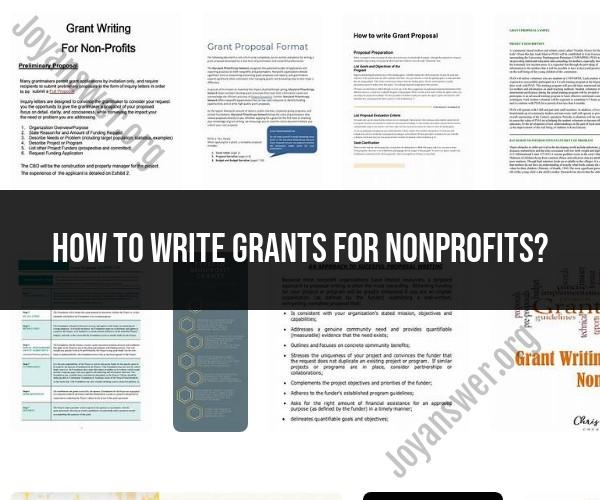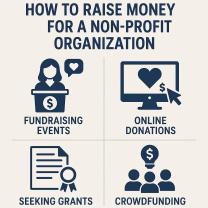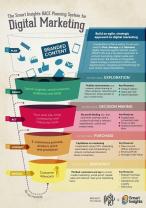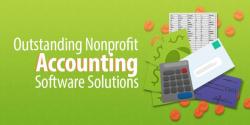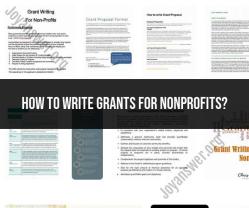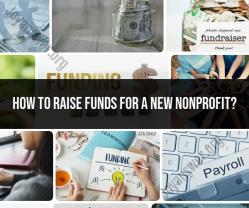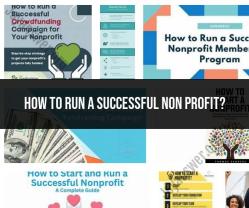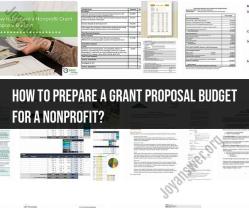How to write grants for nonprofits?
Writing grants for nonprofits involves a structured and strategic approach to secure funding from various sources, including government agencies, foundations, corporations, and individual donors. Here is a comprehensive guide to help you write effective grant proposals for your nonprofit organization:
1. Define Your Project or Program:
- Clearly articulate the project or program for which you are seeking funding. Describe its goals, objectives, target population, and expected outcomes. Ensure that it aligns with your organization's mission and addresses a pressing need in the community.
2. Identify Funding Opportunities:
- Research potential grant opportunities that match your project's focus and goals. Look for grants from government agencies, private foundations, corporate giving programs, and community organizations. Use grant databases and websites to identify suitable prospects.
3. Read and Understand Guidelines:
- Thoroughly review the grant guidelines and eligibility criteria provided by the funding source. Pay close attention to deadlines, submission requirements, allowable expenses, and any specific instructions or formats.
4. Develop a Detailed Budget:
- Create a comprehensive budget that outlines all projected expenses and revenue sources related to your project. Be transparent about how the grant funds will be used, and ensure that your budget aligns with the grantor's priorities.
5. Gather Supporting Documents:
- Collect necessary supporting documents, including your nonprofit's tax-exempt status documentation, financial statements, letters of support or endorsement, and any required organizational information.
6. Craft a Compelling Narrative:
- Write a persuasive and concise grant proposal that tells a compelling story about your organization, project, and the impact it will have. Address the following key components:
- Executive Summary: Provide a brief overview of your proposal.
- Needs Statement: Clearly state the problem or need you are addressing and provide evidence to support it.
- Goals and Objectives: Describe the specific goals and measurable objectives of your project.
- Methodology: Explain how you will implement the project, including strategies and activities.
- Evaluation: Outline how you will measure the success and impact of your project.
- Sustainability: Explain how your organization will sustain the project beyond the grant period.
- Collaboration and Partnerships: Highlight any collaborations or partnerships that strengthen your proposal.
7. Address Evaluation and Impact:
- Describe your evaluation plan, including the metrics and methods you will use to assess the project's success. Emphasize the expected outcomes and the broader community impact.
8. Write Clearly and Concisely:
- Use clear and concise language, avoiding jargon or technical terms that may be unfamiliar to reviewers. Proofread your proposal for grammar and spelling errors.
9. Tailor Each Proposal:
- Customize each grant proposal to align with the priorities and guidelines of the specific funding source. Highlight aspects of your organization and project that resonate with the grantor's mission and interests.
10. Engage Stakeholders:
- Involve key stakeholders, including board members, staff, and community members, in the proposal development process. Their insights and support can enhance the proposal's quality and credibility.
11. Seek Review and Feedback:
- Have colleagues or mentors review your proposal to provide constructive feedback and identify areas for improvement.
12. Submit the Proposal:
- Follow the grantor's submission instructions precisely. Ensure that you meet all deadlines and provide all required documents and attachments.
13. Follow Up and Express Gratitude:
- After submitting your proposal, maintain regular communication with the funding source, if possible. Express gratitude for their consideration and be prepared to respond to any questions or requests for additional information.
14. Be Prepared for Rejection:
- Understand that not all grant proposals will be funded. Use rejection as an opportunity to learn and refine your approach for future grant applications.
Remember that grant writing is a skill that improves with practice. Be persistent, keep refining your proposals, and continue seeking funding opportunities that align with your nonprofit's mission and goals. Building relationships with funders and maintaining transparency and accountability in your projects will also contribute to your success in securing grants for your nonprofit organization.
Writing Successful Grant Proposals for Nonprofits: A Comprehensive Guide
Writing a grant proposal is an essential skill for any nonprofit organization that wants to secure funding for its programs and services. A well-written grant proposal can help you to stand out from other applicants and increase your chances of receiving funding.
This comprehensive guide will walk you through the steps of writing a successful grant proposal, including:
- Identifying the right grant opportunities: The first step is to identify grant opportunities that are a good fit for your organization and its mission. You can do this by searching online grant databases, contacting your local government or foundation, or networking with other nonprofits.
- Understanding the grant requirements: Once you have found some potential grant opportunities, you need to carefully read the grant guidelines to understand the requirements. This includes understanding the eligibility criteria, the deadline, and the format of the proposal.
- Writing a strong proposal narrative: The narrative section of your grant proposal is where you will tell the story of your organization and its mission. It is important to be clear, concise, and persuasive in your writing. You should also highlight the impact of your programs and services, and explain how the grant funding will be used to further your mission.
- Creating a budget: Your budget should clearly outline how you plan to use the grant funding. Be sure to include all relevant expenses, such as staffing, programming, and materials.
- Submitting your proposal: Once you have completed your proposal, be sure to submit it by the deadline. You may also want to have your proposal reviewed by someone else before submitting it.
Funding the Mission: Strategies for Effective Nonprofit Grant Writing
Here are some additional strategies for effective nonprofit grant writing:
- Start early: Don't wait until the last minute to start writing your grant proposal. Give yourself plenty of time to research the grant opportunity, gather the necessary information, and write a polished proposal.
- Be specific: When writing your grant proposal, be specific about what you are asking for and how you plan to use the funds. The more specific you are, the more likely you are to convince the grantor that you are a good use of their resources.
- Be persuasive: Your grant proposal should be persuasive and convincing. Explain why your organization is deserving of funding, and how the grant funding will be used to make a difference.
- Proofread carefully: Before submitting your grant proposal, be sure to proofread it carefully for any errors in grammar or spelling. A well-written proposal will make a good impression on the grantor.
Grant Writing Essentials: Steps to Secure Funding for Nonprofit Organizations
Here are the essential steps to secure funding for nonprofit organizations through grant writing:
- Identify your funding needs: What programs and services do you need funding for? How much money do you need?
- Research funding opportunities: There are many different types of grants available, so it is important to do your research to find opportunities that are a good fit for your organization.
- Develop a grant writing strategy: Once you have identified some potential funding opportunities, you need to develop a strategy for approaching them. This includes understanding the grant requirements, developing a proposal timeline, and assembling a team to help you with the writing process.
- Write a compelling grant proposal: Your grant proposal is your opportunity to tell the story of your organization and its mission, and to explain why you are deserving of funding. Be sure to write a clear, concise, and persuasive proposal that highlights the impact of your work.
- Submit your proposal and follow up: Once you have submitted your proposal, be sure to follow up with the grantor to ensure that they have received it and to answer any questions they may have.
Grant writing can be a daunting task, but it is an essential skill for any nonprofit organization that wants to secure funding for its programs and services. By following the tips in this guide, you can increase your chances of writing a successful grant proposal and securing the funding you need to achieve your mission.
